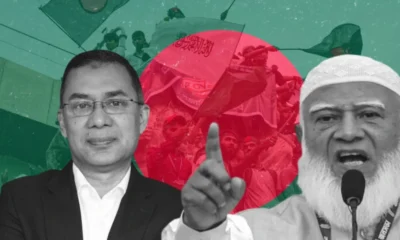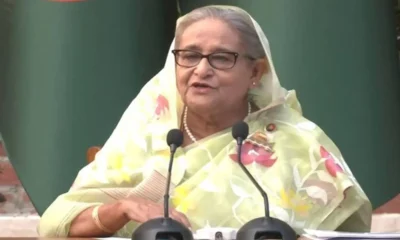[vc_row][vc_column][vc_column_text]Over 600,000 Rohingya Muslims have fled to Bangladesh from Myanmar since the army began an ethnic cleansing drive in August; repatriation to begin in two months
Even as global leaders and human rights organisations continue to voice concerns over the safety of Rohingya Muslims in the strife-torn Rakhine State, the Myanmar government signed a repatriation deal with Bangladesh, on Thursday, under which it would allow members of the persecuted ethnic minority to return to their home country.
The deal, termed by the Bangladeshi establishment as a “primary step” towards the rehabilitation of Rohingya Muslims, will however take about two months to come into effect since both countries will first have to prepare the ground work for identifying and then verifying Rohingya refugees who have fled Myanmar’s Rakhine State since August this year.
The Rohingyas, often seen as the world’s most persecuted ethnic minority, had begun to flee the Rakhine State – a majority of them taking refuge in neighbouring Bangladesh – since August this year when Myanmar’s military began a violent and barbaric crackdown against the community. The crackdown, described by the international community and more recently by US Secretary of State, Rex Tillerson as ‘ethnic cleansing’, had begun after militant members of the Arakan Rohingya Salvation Army (ARSA) allegedly attacked an outpost of the Myanmar army.
Thursday’s repatriation deal was signed by Bangladesh Foreign Minister AH. Mahmud Ali and Myanmar State Counsellor Aung San Suu Kyi in Myanmar’s capital Naypyidaw. Suu Kyi, a Nobel Peace Prize winner, has been under a strident attack by the global community and her brethren from the Nobel laureate fraternity for allegedly turning a blind eye towards the atrocities on the Rohingyas.
According to some estimate, over 600,000 Rohingya Muslims have fled Myanmar to take refuge in neighbouring Bangladesh since August this year. The mass exodus of the people from Rakhine State has caused huge stress on the resources of a financially constrained Bangladesh which also stare at the possibility of clashes erupting on its soil if the humanitarian crisis is not addressed at a war footing.
Details on the repatriation deal were, however, not immediately available and the Bangladesh foreign minister was quoted in media reports as saying that his government would elaborate on the nuances of the memorandum of understanding “once we return to Dhaka.”
“We have to start the process. The houses there (in Rakhine State) have been torched… levelled. They need to be rebuilt… We are ready to take them (Rohingyas) back as soon as possible after Bangladesh sends the (registration) forms back to us,” Myint Kyaing, a permanent secretary at Myanmar’s Ministry of Labour, told mediapersons in Naypyidaw.
All Rohingya refugees who wish to avail benefits of the repatriation deal are required to fill the registration forms and submit them to the Bangladesh government. These forms will then be verified by the Myanmar government following which the repatriation process is expected to commence.
Prime Minister Sheikh Hasina had, prior to signing of the deal with Suu Kyi, renewed her call to Myanmar to immediately start the repatriation of Rohingya.
While Bangladesh has been insistent on repatriation of the Rohingya Muslims within a time-bound framework, it is learnt that the Myanmar government has not agreed to such conditionality yet and has also rejected the possibility of involvement of agencies affiliated with the United Nations to help in the verification process.
Myanmar and Bangladesh have, however, decided to form a joint working group at the foreign-secretary level to start the repatriation process which Aung San Suu Kyi has described as a “win-win situation for both countries” while calling for “amicable bilateral negotiations” to end the crisis.
On September 18, Under attack from the global community and her fellow Nobel laureates, Myanmar State Counsellor Aung San Suu Kyi had invited diplomats of various missions in her country to speak to them on the issue of violence in the troubled Rakhine state and the measures being taken by her government to restore peace.
Suu Kyi had then asserted: “We are concerned to hear that numbers of Muslims are fleeing across the border to Bangladesh. We want to find out why the exodus is happening.” She had, however, also sought to apparently downplay the extent of the humanitarian crisis in her country by asserting that while her administration wanted to “talk to those who have fled”, it also felt important that the world must take into account “those who have stayed”.
“More than 50 per cent of villages of Muslims are intact and are as they were before the attacks took place”, Suu Kyi had said, despite reports from the ground and by various independent human rights groups who visited Rakhine during the period suggesting otherwise.
It was during her 30-minute speech to diplomats in September that Suu Kyi had first announced that her government was “prepared to start the verification process of refugees (who moved to Bangladesh from the Rakhine) who wish to return” to Myanmar and insisted that “those who have been verified as refugees will be accepted without any problems and with full assurance of security and access to humanitarian aid.”[/vc_column_text][/vc_column][/vc_row]


 Latest world news17 hours ago
Latest world news17 hours ago
 Latest world news17 hours ago
Latest world news17 hours ago
 India News17 hours ago
India News17 hours ago
 Latest world news16 hours ago
Latest world news16 hours ago
 India News16 hours ago
India News16 hours ago















